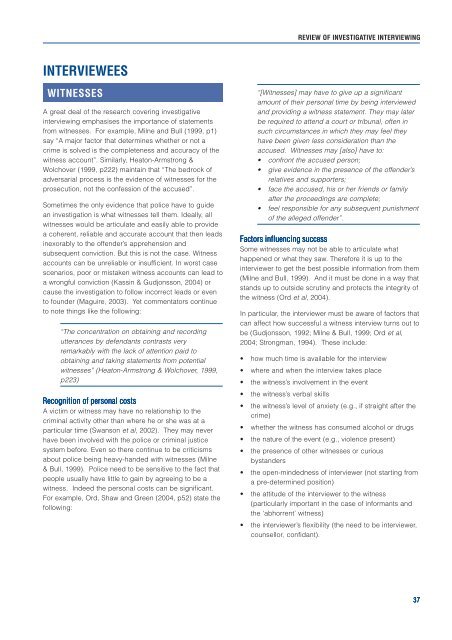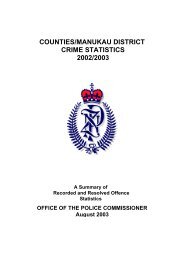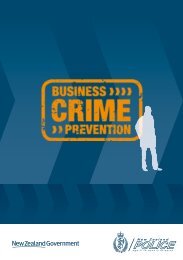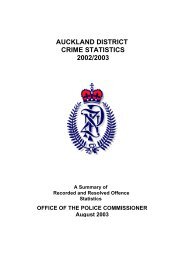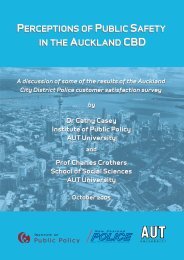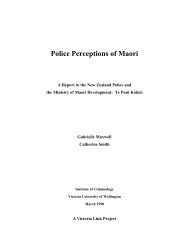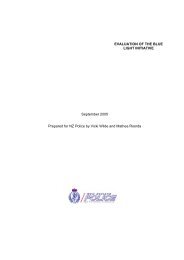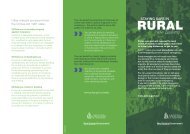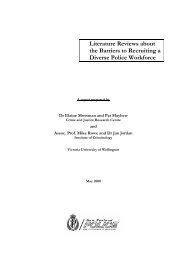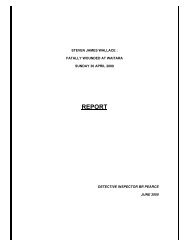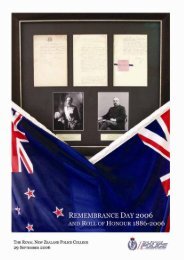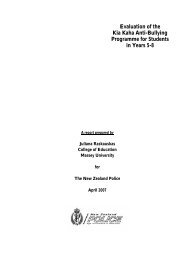Investigative interviewing: the literature - New Zealand Police
Investigative interviewing: the literature - New Zealand Police
Investigative interviewing: the literature - New Zealand Police
You also want an ePaper? Increase the reach of your titles
YUMPU automatically turns print PDFs into web optimized ePapers that Google loves.
REVIEW OF INVESTIGATIVE INTERVIEWING<br />
INTERVIEWEES<br />
WITNESSES<br />
A great deal of <strong>the</strong> research covering investigative<br />
<strong>interviewing</strong> emphasises <strong>the</strong> importance of statements<br />
from witnesses. For example, Milne and Bull (1999, p1)<br />
say “A major factor that determines whe<strong>the</strong>r or not a<br />
crime is solved is <strong>the</strong> completeness and accuracy of <strong>the</strong><br />
witness account”. Similarly, Heaton-Armstrong &<br />
Wolchover (1999, p222) maintain that “The bedrock of<br />
adversarial process is <strong>the</strong> evidence of witnesses for <strong>the</strong><br />
prosecution, not <strong>the</strong> confession of <strong>the</strong> accused”.<br />
Sometimes <strong>the</strong> only evidence that police have to guide<br />
an investigation is what witnesses tell <strong>the</strong>m. Ideally, all<br />
witnesses would be articulate and easily able to provide<br />
a coherent, reliable and accurate account that <strong>the</strong>n leads<br />
inexorably to <strong>the</strong> offender’s apprehension and<br />
subsequent conviction. But this is not <strong>the</strong> case. Witness<br />
accounts can be unreliable or insufficient. In worst case<br />
scenarios, poor or mistaken witness accounts can lead to<br />
a wrongful conviction (Kassin & Gudjonsson, 2004) or<br />
cause <strong>the</strong> investigation to follow incorrect leads or even<br />
to founder (Maguire, 2003). Yet commentators continue<br />
to note things like <strong>the</strong> following:<br />
“The concentration on obtaining and recording<br />
utterances by defendants contrasts very<br />
remarkably with <strong>the</strong> lack of attention paid to<br />
obtaining and taking statements from potential<br />
witnesses” (Heaton-Armstrong & Wolchover, 1999,<br />
p223)<br />
Recognition of personal costs<br />
A victim or witness may have no relationship to <strong>the</strong><br />
criminal activity o<strong>the</strong>r than where he or she was at a<br />
particular time (Swanson et al, 2002). They may never<br />
have been involved with <strong>the</strong> police or criminal justice<br />
system before. Even so <strong>the</strong>re continue to be criticisms<br />
about police being heavy-handed with witnesses (Milne<br />
& Bull, 1999). <strong>Police</strong> need to be sensitive to <strong>the</strong> fact that<br />
people usually have little to gain by agreeing to be a<br />
witness. Indeed <strong>the</strong> personal costs can be significant.<br />
For example, Ord, Shaw and Green (2004, p52) state <strong>the</strong><br />
following:<br />
“[Witnesses] may have to give up a significant<br />
amount of <strong>the</strong>ir personal time by being interviewed<br />
and providing a witness statement. They may later<br />
be required to attend a court or tribunal, often in<br />
such circumstances in which <strong>the</strong>y may feel <strong>the</strong>y<br />
have been given less consideration than <strong>the</strong><br />
accused. Witnesses may [also] have to:<br />
• confront <strong>the</strong> accused person;<br />
• give evidence in <strong>the</strong> presence of <strong>the</strong> offender’s<br />
relatives and supporters;<br />
• face <strong>the</strong> accused, his or her friends or family<br />
after <strong>the</strong> proceedings are complete;<br />
• feel responsible for any subsequent punishment<br />
of <strong>the</strong> alleged offender”.<br />
Factors influencing success<br />
Some witnesses may not be able to articulate what<br />
happened or what <strong>the</strong>y saw. Therefore it is up to <strong>the</strong><br />
interviewer to get <strong>the</strong> best possible information from <strong>the</strong>m<br />
(Milne and Bull, 1999). And it must be done in a way that<br />
stands up to outside scrutiny and protects <strong>the</strong> integrity of<br />
<strong>the</strong> witness (Ord et al, 2004).<br />
In particular, <strong>the</strong> interviewer must be aware of factors that<br />
can affect how successful a witness interview turns out to<br />
be (Gudjonsson, 1992; Milne & Bull, 1999; Ord et al,<br />
2004; Strongman, 1994). These include:<br />
• how much time is available for <strong>the</strong> interview<br />
• where and when <strong>the</strong> interview takes place<br />
• <strong>the</strong> witness’s involvement in <strong>the</strong> event<br />
• <strong>the</strong> witness’s verbal skills<br />
• <strong>the</strong> witness’s level of anxiety (e.g., if straight after <strong>the</strong><br />
crime)<br />
• whe<strong>the</strong>r <strong>the</strong> witness has consumed alcohol or drugs<br />
• <strong>the</strong> nature of <strong>the</strong> event (e.g., violence present)<br />
• <strong>the</strong> presence of o<strong>the</strong>r witnesses or curious<br />
bystanders<br />
• <strong>the</strong> open-mindedness of interviewer (not starting from<br />
a pre-determined position)<br />
• <strong>the</strong> attitude of <strong>the</strong> interviewer to <strong>the</strong> witness<br />
(particularly important in <strong>the</strong> case of informants and<br />
<strong>the</strong> ‘abhorrent’ witness)<br />
• <strong>the</strong> interviewer’s flexibility (<strong>the</strong> need to be interviewer,<br />
counsellor, confidant).<br />
37


